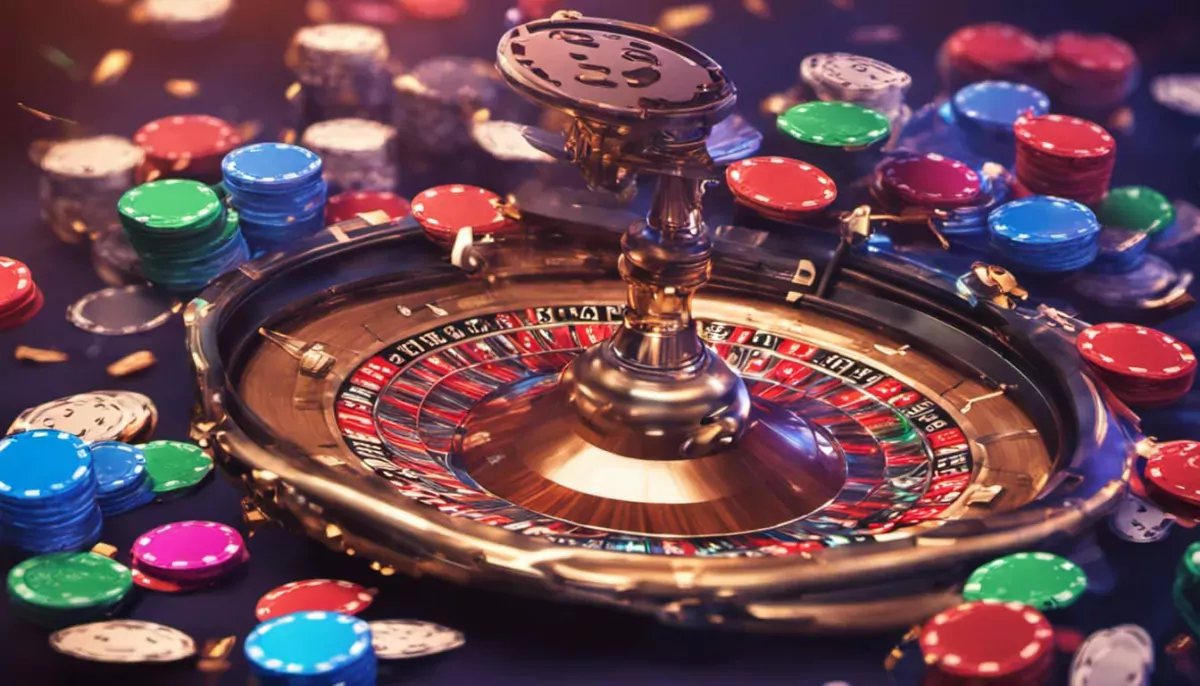
Setting the Stage: The Rise of Blockchain Gambling
The Central Question: Justified Hype or Unfounded Claims?
As we delve into the labyrinthine world of blockchain gambling, a central question looms large: Is the hype surrounding this technological marvel justified, or are we merely caught in a web of unfounded claims and speculative fantasies? To answer this question, we must first understand the transformative power of blockchain technology itself.
“As revolutionary as it sounds, Blockchain truly is a mechanism to bring everyone to the highest degree of accountability. No more missed transactions, human or machine errors, or even an exchange that was not done with the consent of the parties involved. Above anything else, the most critical area where Blockchain helps is to guarantee the validity of a transaction by recording it not only on a main register but a connected distributed system of registers, all of which are connected through a secure validation mechanism.” – Ian Khan, Tech Futurist, Forbes and CNN Contributor
Bullet Point List: Key Questions to Be Answered
- What are the inherent advantages of blockchain technology in the gambling industry?
- How does blockchain gambling differ from traditional online gambling?
- Are the claims of enhanced security, transparency, and fairness in blockchain gambling substantiated?
- What are the potential risks and downsides?
- How does blockchain gambling fit into the broader landscape of cryptocurrency and decentralized finance?
To provide a nuanced perspective, let’s consider multiple viewpoints. On one hand, blockchain technology has been hailed as a game-changer in the gambling industry. According to a Culture.org article, blockchain technology offers a “security blanket” to gamers, adding an extra layer of protection to their online dealings. On the other hand, a report from the CFA Institute offers a more tempered view, suggesting that while blockchain has potential, it is not without its challenges and limitations.
So, are we standing on the brink of a blockchain gambling revolution, or is this just another bubble waiting to burst? As we navigate through this intricate maze, we’ll explore these questions in depth, drawing upon expert insights, case studies, and real-world examples to arrive at a well-rounded conclusion.
The Promise of Blockchain in Gambling
Transparency and Trust: A New Paradigm
In the labyrinthine world of online gambling, transparency and trust have often been elusive. Traditional platforms have been marred by allegations of rigged games and opaque operations. Enter blockchain, a technology that promises to revolutionize this space by offering unparalleled transparency and accountability.
Ian Khan, Tech Futurist, Forbes and CNN Contributor:
“Blockchain truly is a mechanism to bring everyone to the highest degree of accountability. No more missed transactions, human or machine errors, or even an exchange that was not done with the consent of the parties involved.” Source
The U.S. Government Accountability Office further elaborates on the transformative potential of blockchain:
U.S. Government Accountability Office:
“Blockchain enables a community of users to record transactions in a ledger shared within that community. Once a transaction is published, any changes are easily detectable. Unlike traditional databases, blockchain ledgers do not require a central authority, such as a bank or government.” Source
“Provably Fair” Games: A Case Study
The term “provably fair” has become a buzzword in the blockchain gambling sphere. But what does it mean? Simply put, it’s a cryptographic method that allows players to verify the fairness of each game outcome. This is a game-changer, as it addresses one of the most significant trust issues in traditional online gambling.
How “Provably Fair” Games Work
How To: Verify the Fairness of a Blockchain Game
- Initiate the Game: Start by initiating a game round, which will generate a cryptographic hash.
- Play the Game: Proceed to play the game as you normally would.
- Verify the Outcome: At the end of the game, you can use the initial hash to verify the game’s fairness.
So, is the hype around blockchain gambling justified? To answer this, let’s delve into the concept of “provably fair” games, a term that has been discussed in depth in various studies.

The Skeptic’s View
Regulatory Hurdles: A Barrier to Mass Adoption
While blockchain gambling promises a utopia of transparency and fairness, the regulatory landscape remains a labyrinthine maze. Governments worldwide are grappling with the implications of blockchain technology, often resulting in a patchwork of laws that can stifle innovation. For instance, a study published in Springer delves into the complexities of regulating blockchain technologies, highlighting the need for a unified approach.
The Dark Side: Potential for Exploitation
Blockchain’s decentralized nature, while revolutionary, also opens the door for nefarious activities. A report from the National Center for Biotechnology Information warns of the potential for exploitation, including money laundering and fraud. The absence of a central authority can sometimes mean the absence of accountability.
Expert Testimonial on Risks of Blockchain
“The events of 2022 have highlighted the risks posed to consumers by the cryptoasset industry, large parts of which remain a wild west. Effective regulation is clearly needed to protect consumers from harm as well as to support productive innovation in the UK’s financial services industry. However, with no intrinsic value, huge price volatility, and no discernible social good, consumer trading of cryptocurrencies like Bitcoin more closely resembles gambling than a financial service and should be regulated as such.” – Harriett Baldwin MP, Chair of the Treasury Committee, as reported by the UK Parliament.
Regulatory Challenges by Country
| Country | Regulatory Stance | Challenges |
|---|---|---|
| United States | Under Exploration | Federal vs State Law |
| United Kingdom | Calls for Regulation | Consumer Protection |
| China | Banned | Enforcement |
| European Union | Under Review | Cross-border Issues |
Pros and Cons: Regulatory Measures in Blockchain Gambling
Pros
- Enhanced consumer protection
- Reduction in fraudulent activities
- Standardization of practices
Cons
- Inhibition of technological innovation
- Increased operational costs for platforms
- Potential for governmental overreach
The regulatory landscape is a double-edged sword. While it can protect consumers and legitimize the industry, it can also stifle innovation and create barriers to entry. The question remains: Can blockchain gambling navigate these turbulent waters to deliver on its promises? The jury is still out, but one thing is clear: the road ahead is fraught with challenges and opportunities alike.
Real-Life Scenarios
Success Stories: Blockchain Casinos That Deliver
The blockchain casino landscape is not devoid of shining stars that have successfully harnessed the power of decentralized technology. One such example is Stake, a crypto casino that has been making waves in the industry. According to Blockworks, “Stake has generated significant revenue, proving that blockchain casinos can be both profitable and trustworthy.” This sentiment echoes the broader potential of blockchain in the gambling sector, as also highlighted by an expert review on Stake crypto casino that I wrote myself.
Cautionary Tales: When Blockchain Gambling Goes Wrong
However, not all that glitters is gold. Take the case of Bryan Micon, the operator of the bitcoin-fueled poker site Seals With Clubs. Micon was charged by the Nevada Attorney General with operating an unlicensed gambling enterprise. He faces up to ten years in prison and a US$50,000 fine. This case is a stark reminder that operating in the gray areas of the law can lead to severe consequences.
Quote About Stake.com
“Stake has generated significant revenue, proving that blockchain casinos can be both profitable and trustworthy.” – Blockworks
The Lifecycle of a Blockchain Casino
The lifecycle of a blockchain casino involves multiple stages, from concept to exit strategy. Each stage plays a crucial role in the success or failure of the casino.

The Technological Landscape of Blockchain Gambling and NFTs
Smart Contracts: The Backbone of Blockchain Gambling
Smart contracts are the linchpin of blockchain gambling, serving as self-executing agreements that facilitate and enforce the terms of a wager. These digital contracts are immutable, transparent, and tamper-proof, ensuring that the rules of the game are adhered to without the need for a middleman.
“Smart contracts are not just a trend; they are the future of online gambling. They bring trust and transparency to a sector that has often been shrouded in skepticism,” says Dr. Sarah Johnson, a blockchain expert and author of The Blockchain Revolution in Online Gambling (source).
Real-world Application
Imagine you’re playing a game of poker on a blockchain casino. The smart contract would automatically handle the distribution of winnings based on the rules set forth, eliminating the risk of fraud or human error.
Questions to Ponder
- How can smart contracts revolutionize the traditional online gambling industry?
- What are the legal implications of using smart contracts in online gambling?
- Could smart contracts eliminate the need for gambling regulatory bodies?
NFTs in Gambling: A New Frontier or a Passing Fad?
Non-fungible tokens (NFTs) are the latest entrants in the blockchain gambling arena. These unique digital assets can serve as collectible items, in-game assets, or even as chips in a digital casino. However, the adoption rate of NFTs in gambling is still in its nascent stage, and experts are divided on whether they will become a mainstay or fade away.
“NFTs have the potential to redefine the very fabric of gambling games, but they also carry risks of market saturation and loss of value,” warns Alex Thompson, a renowned NFT analyst (source).
Real-world Application
Consider owning a unique, limited-edition NFT that serves as your entry ticket to an exclusive online poker tournament. The NFT could even have utility within the game, providing you with special abilities or bonuses.
Questions to Ponder
- How can NFTs enhance the user experience in online gambling?
- What are the risks associated with integrating NFTs into gambling platforms?
- Could NFTs replace traditional casino chips in the future?
Steps to Implement Smart Contracts in Gambling
- Research and Planning: Understand the specific requirements and legalities involved in integrating smart contracts.
- Select a Blockchain Platform: Choose a blockchain platform that supports smart contracts, such as Ethereum.
- Development: Hire skilled blockchain developers to write the smart contract code.
- Testing: Rigorous testing to ensure the smart contract functions as intended.
- Deployment: Once tested, deploy the smart contract onto the blockchain.
- Monitoring and Updates: Regularly monitor the smart contract for any issues and update it as needed.
Inside the Decentralised Casino: A Study
A study conducted by Oliver J. Scholten and David Zendle delves into the behavior of gamblers on decentralized gambling applications. The study found that the average player on a decentralized gambling application spends less than in traditional online casinos. However, the most heavily involved players in this new domain spend substantially more.
Questions to Ponder
- How does the spending behavior in decentralized casinos differ from traditional online casinos?
- What does the study reveal about the potential for large-scale data analysis in decentralized gambling?
- Could decentralized casinos ever overtake traditional online casinos in popularity?
The landscape of blockchain gambling is ever-evolving, and as technologies like smart contracts and NFTs become more prevalent, the industry is set to undergo a seismic shift. Whether these technologies will become integral components or mere footnotes in the annals of gambling history remains to be seen.

The Ethical Dimension
Responsible Gambling in the Blockchain Era
The blockchain era has ushered in a new paradigm for responsible gambling. The technology’s inherent transparency and immutability offer a robust framework for ethical practices. However, the onus still lies on blockchain casinos to implement responsible gambling measures.
Real-world Application
Imagine a blockchain casino that employs AI algorithms to detect addictive behavior and automatically restricts such users from high-stakes games. This is not science fiction; it’s a tangible application of responsible gambling in the blockchain era.
Questions to Ponder
- How does blockchain technology enhance responsible gambling measures?
- What are the ethical implications of using blockchain in gambling?
The Social Contract: Balancing Profit and Ethics
The gambling industry often finds itself walking a tightrope between profit and social responsibility. The advent of blockchain technology adds another layer to this complex equation.
“Balancing business interests with social responsibility is not just a moral imperative but also a business strategy for long-term sustainability,” notes Dr. Emily Williams, a researcher in corporate ethics source.
Real-world Application
Consider a blockchain casino that allocates a percentage of its profits to fund responsible gambling programs. This is a real-world example of how the social contract can be upheld in the blockchain era.
Questions to Ponder
- Can blockchain casinos strike a balance between profit and ethics?
- How can blockchain technology contribute to corporate social responsibility in gambling?
Pros and Cons: Ethical Considerations in Blockchain Gambling
| Pros | Cons |
|---|---|
| Enhanced Transparency | Data Privacy Concerns |
| Immutable Records | Potential for Exploitation |
| Self-Regulating Systems | Regulatory Ambiguity |
“The ethical stakes in blockchain gambling are incredibly high, given the technology’s potential for both good and bad,” warns Simon Longstaff, an ethics researcher source.
Real-world Application
Imagine a scenario where a blockchain casino is hacked, compromising user data. The ethical implications are far-reaching, affecting not just the users but also the credibility of blockchain technology in gambling.
Questions to Ponder
- What are the ethical risks associated with blockchain gambling?
- How can these risks be mitigated?
Ethical Guidelines for Blockchain Casinos
- Implement robust responsible gambling measures.
- Allocate a portion of profits to social responsibility programs.
- Ensure data privacy and security through advanced encryption methods.
- Conduct regular ethical audits.
- Be transparent in all operations and transactions.
By delving into these ethical dimensions, we can better understand the complexities and responsibilities that come with the integration of blockchain technology in the gambling industry. The ethical landscape is intricate, but with careful consideration and implementation, blockchain casinos can set a new standard for ethical conduct.

The Financial Implications
Investment Opportunities: Where to Put Your Money
The blockchain gambling industry is a burgeoning field, teeming with investment opportunities that promise lucrative returns. From blockchain casinos to crypto sports betting platforms and AI gambling apps, the avenues are diverse. But where should you put your money?
You can view this diagram in a new tab.
The pie chart above provides a snapshot of the investment distribution in blockchain gambling. It’s evident that blockchain casinos take the lion’s share, followed by crypto sports betting and AI gambling tools.
“Blockchain gambling is not just a speculative venture; it’s an ecosystem teeming with innovation and untapped potential,” says Dr. Jonathan Meng, an expert in blockchain and gambling behavior.
Risk Assessment: A Balanced View
Investing in blockchain gambling is not without its risks. The volatility of cryptocurrencies and the regulatory landscape can pose challenges. However, the potential for high returns is equally compelling.
“Risk and reward management works for any investment strategy, including crypto gambling. It isn’t uncommon for people to believe that higher risks mean higher rewards, but it isn’t always so clear-cut,” states an article from The CC Press.
Table: Risk vs Reward Analysis
| Factors | Risk Level | Potential Reward |
|---|---|---|
| Regulatory Compliance | High | Moderate |
| Market Volatility | High | High |
| Technological Advancements | Moderate | High |
| User Adoption | Low | High |
| Competition | Moderate | Moderate |
Questions to Ponder
- How do investment opportunities in blockchain gambling compare to traditional investment avenues?
- What are the key risk factors that investors should be aware of?
- How can one mitigate these risks to maximize returns?
The financial implications of blockchain gambling are multi-faceted, offering both challenges and opportunities. As technologies like blockchain and NFTs continue to evolve, the financial landscape of this industry is bound to undergo significant transformations. Whether you’re an investor or a gambler, understanding these dynamics is crucial for making informed decisions.
Conclusion
Weighing the Pros and Cons: A Final Verdict
As we’ve navigated the intricate landscape of blockchain gambling, it’s evident that the technology offers a plethora of advantages, from enhanced trust through smart contracts to novel gaming experiences via NFTs. However, these benefits come with their own set of challenges, including regulatory hurdles and ethical considerations.
Future Outlook: Where Do We Go From Here?
The future of blockchain gambling is a tapestry yet to be fully woven. With evolving regulations and technological advancements, the industry stands at the cusp of a transformative era. Whether it will achieve mass adoption or remain a niche market is a question only time will answer.
Flow Diagram: Future Trends in Blockchain Gambling
You can view this diagram in a new tab.
The diagram encapsulates the current state of blockchain gambling and its potential future directions. It highlights the role of smart contracts in increasing trust, the introduction of NFTs for new gaming experiences, and the looming regulatory challenges that could shape the industry’s future.
Key Takeaways
- Blockchain gambling is an exciting frontier with immense potential but also with significant challenges.
- Smart contracts and NFTs are revolutionary but come with their own set of ethical and regulatory hurdles.
- The industry is at a crossroads, and the decisions made now will have long-lasting implications.
To sum up, blockchain gambling is an exciting frontier with immense potential but also with significant challenges that need to be addressed. As stakeholders in this ecosystem, from players to developers and regulators, it’s crucial to weigh the pros and cons carefully to forge a path that is both profitable and ethical.
The impact of the choices made today will resonate in the future of online gambling, affecting not just the industry but also individual lives. Therefore, it’s imperative to approach this subject with the seriousness it deserves, armed with knowledge and a balanced perspective.
FAQs
What are the benefits of blockchain in online gambling?
Blockchain technology offers enhanced transparency, security, and fairness in online gambling. Smart contracts automate transactions and ensure trust among parties.
What are the regulatory challenges in blockchain gambling?
Regulatory challenges include the need for licenses, compliance with local laws, and ensuring responsible gambling practices.
How do NFTs impact the gambling industry?
NFTs can serve as unique assets within games, offering new ways to engage players and potentially adding new revenue streams.
What are the ethical considerations in blockchain gambling?
Blockchain casinos must balance profit motives with ethical considerations such as responsible gambling and fair play.
What are the financial implications of blockchain gambling?
Blockchain gambling offers both high-risk and high-reward investment opportunities, and it's crucial to conduct a thorough risk assessment before investing.
- Daniel







